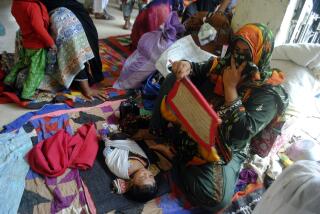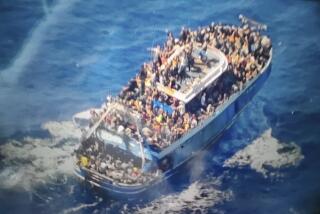A year later, legacy of refugee crisis has Greeks fearing paradise lost
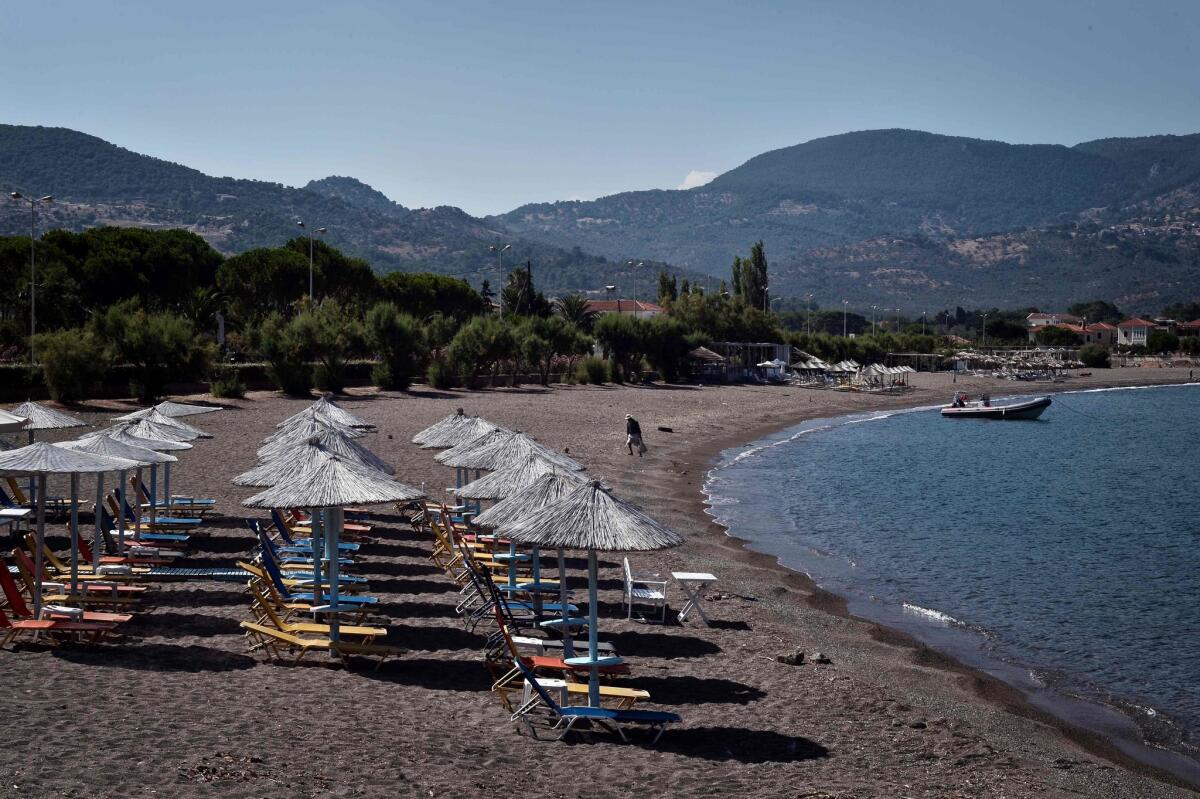
- Share via
Reporting from Molyvos, Greece — Early on a quiet August morning, Rabbit Island, an uninhabited rocky outcrop off the coast of Lesbos, is everything a Greek island paradise should be.
The sea is a deep azure. Waves are lapping at the sand. A small boat is moored to the makeshift pier. On board, a young couple are asleep, the man’s outstretched arm cushioning the woman’s head from the floorboards.
As Stratis Kabanas steers his wooden boat around the island to head to the port of Molyvos, a fluorescent life jacket, abandoned in the chaos of last year’s exodus of a million refugees, adds a discordant note to the idyll of the day.
The boatman revs the engine. The vessel slides past this jarring reminder that not all is well in this part of paradise.
Kabanas has relied on his boat, Escape, and the European tourists who regularly visit Lesbos, to make a living for the last 20 years. This year, he didn’t get a fare until July 1. Tourists have shied away from the island, the epicenter of the biggest refugee crisis since World War II.
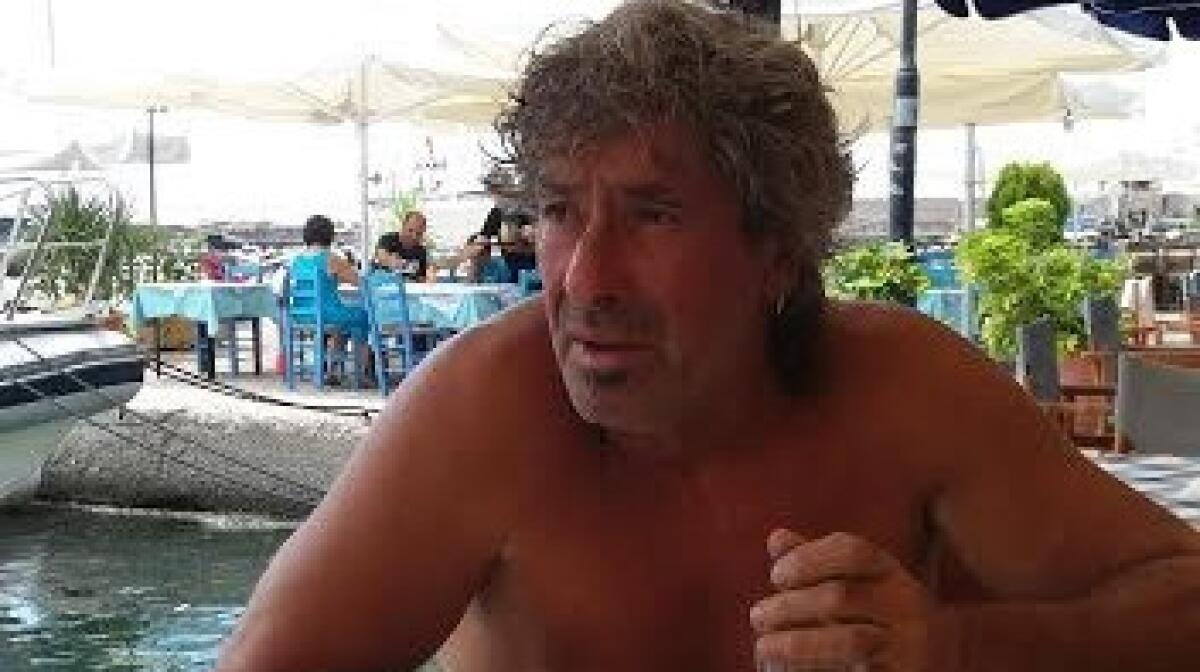
While the scenes of desperate men, women and children flinging themselves onto the shores of Europe’s border – the Greek coastline – are fading from the world’s screens, last year’s exodus has given Lesbos a label that islanders fear will be difficult to change: that of a haven for the desperate, not a playground for vacationers.
“Refugees have been coming here for 20 years,” says the fit and bronzed Kabanas, a 56-year-old with salt-and-pepper hair. “But I understood ... last year that this was history in the making. It is very hard to describe to you what 5,000 people arriving in a day looks like.”
About 800,000 people fled war and poverty via Lesbos last year, crossing the narrow strait that separates the Greek island from the Turkish coastline. That’s nearly 10 times the number of people on the island, Greece’s third largest. And while refugee arrivals have slowed thanks to a controversial pact brokered in March between the European Union and Turkey, they have not stopped, keeping officials and locals nervous.
For the six years that Greece has battled a financial crisis that threatened to tip it into chaos, tourism has been the mainstay of the economy. For most of that time, Greece reaped the unfortunate benefits of the turmoil in Egypt, Syria, Turkey and the wider Middle East as western Europeans opted for safe summer destinations -- such as the Greek islands.
But in the last year, despite a campaign to boost visitors to the islands most affected by the refugee crisis, tourism has slumped. International arrivals to the airport at the main port, Mytilini, numbered 6,982 in July, according to the Assn. of Greek Tourism Enterprises, a 62% drop from the same month last year. That is the biggest decline of the major Greek destinations surveyed by the organization.
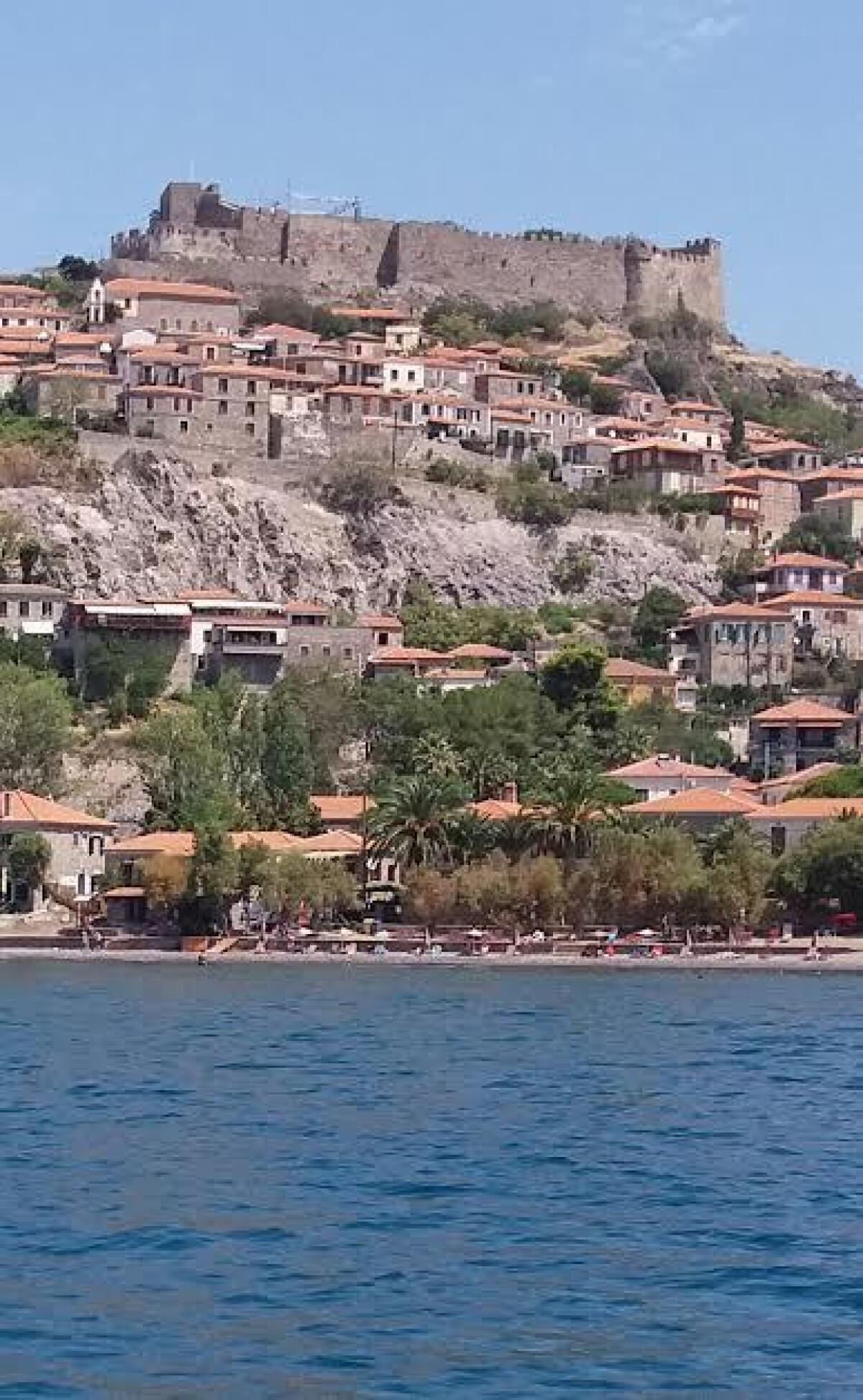
There are few signs of last summer’s events in Molyvos, a hillside port of stately stone houses with brightly colored doors and windows. The mountains of discarded, often useless life jackets used by the refugees and migrants have been removed from the island’s beaches, along with the flotsam and jetsam of the rickety boats that ferried them. The lines of people walking across the island to Mytilini and from there to mainland Greece and the rest of Europe are history, primarily because in February, Greece’s northern neighbors shut down their borders and haven’t opened them since.
Under the March pact, any new arrivals are immediately detained and subject to a fast-track asylum process that could mean return to Turkey if the application is refused. The agreement worked: Arrivals average about 70 to 100 a day since the agreement, according to Greek officials, compared with thousands in September last year.
But the pact also left more than 59,000 refugees and migrants stranded in Greece, where the debt-stricken country has struggled to feed, house and accommodate them. And there are signs of an uptick in the refugee flow: On Tuesday, the Greek government reported a daily tally of 462 arrivals.
The Syrian civil war continues unabated – and Syrians account for more than half of the incoming. Nearly half are children. The failed July 15 coup attempt in Turkey has fanned concern that Turkey may abandon the pact, but so far there is no sign of that.
Fleeing Syria: A look back at the scene on Lesbos last year »
Greek Immigration Minister Ioannis Mouzalas told reporters recently that the decline in the refugee flow “shows the significance of the agreement between Europe and Turkey. And yes we are concerned about any sources of instability that can affect it.”
Without the March 18 pact, Greece would be dealing with an additional 130,000 to 180,000 refugees and migrants on top of the ones already here, he said.
In Mytilini, young Greeks in shorts and flip-flops mingle with young detainees in head scarves and long skirts taking a break from a detention center at Moria, one of two on the island. Hotels host lawyers, translators and officials from aid organizations instead of tourists.
But that version of disaster tourism isn’t making up the losses for tourist areas such as Molyvos.
While Mouzalas champions the pact, he underlines that not all parties are playing their part. More than 7,000 of the refugees in Greece are ready for relocation to other European nations, which was part of the deal, but no European nation has stepped up.
Meanwhile, the Greeks are building more camps around the country in response to fierce criticism of living conditions in detention camps and accommodation centers, some of which have been established in abandoned warehouses and other less-than-ideal sites.
In Myrsini, on the west coast of Greece, tourism and the refugee crisis have intersected in a way that could be a model.
The LM Village resort was built by two municipalities to provide affordable vacations for low-income families, but lay unused for six years before Nabil-Iosif Morad, the local mayor, convinced his councilors and constituents to house refugee families stranded in the country. Morad is a Syrian doctor who came to Greece in 1991 and was elected mayor in 2014.
About 250 Syrians, including 150 children, are living in the 38 picturesque summer bungalows, which have been open for the last five months.
“It’s a model for what we want to do,” says Dimitra Mouteveli, a civil engineer who advises the immigration minister and has come to LM Village to consult with Morad. “These people aren’t going anywhere soon. They need medical services, teaching facilities, psychological support…. Here we already have this to a great degree. It can be a prototype for all the others.“
The resort’s mini-mart has been turned into a social center, offering German lessons each day for all. Organizers hold “Olympic games” such as pingpong and volleyball for the children, though there were few televisions available to watch the actual Olympics when they were underway in Rio.
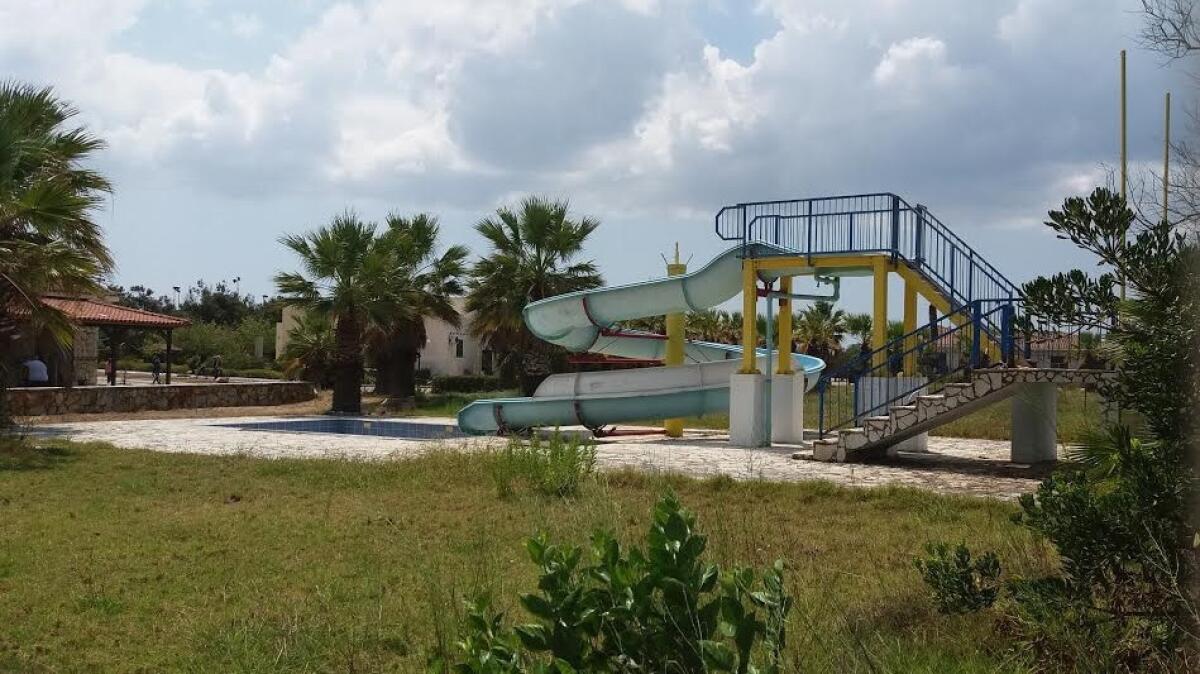
A water slide lies baking in the sun, without water, even though the resort is full of children. The pool is empty. Children play in the gardens or resort streets; some sit around a wooden table speaking with two volunteers – young students from the nearby University of Patras who are teaching them Greek.
Ahmed Berajikli, an electrician from the war-ravaged ancient city of Aleppo, has planted vegetables in his garden, and hung signs in English thanking the Greeks but expressing hope that he can join his son in Germany.
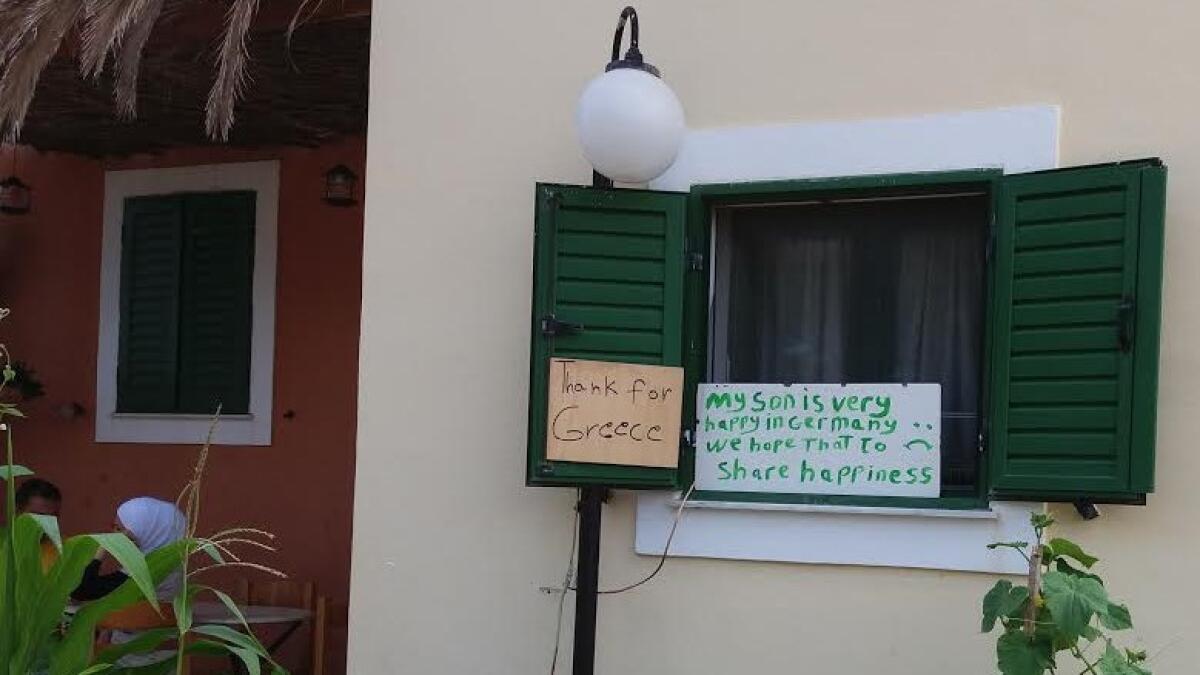
That is where he wants to be, he says in halting English, because he can’t go back to Aleppo. “Maybe in 50 years,” he says. “It is a big problem, not small.”
With the memory of last summer still raw, boatman Kabanas is watchful as he heads back into Molyvos. The coast guard vessel is headed out to sea, he says, strange because it usually moves out at night. It’s a bad omen, one proved the next day when the coast guard reported picking up more than 200 refugees and migrants. But he is, like Berajikli, taking the long view.
“The Syrians, the doctors, lawyers who land in Germany, they will come back here in 10, 20 years,” he said. “They will bring their children to see where they first stepped foot on European land. They will come to remember the people they lost. They are the tourists of the future and they will think to thank the people of Lesbos.”
Petrakis is a special correspondent.
ALSO
The migrant crisis, as seen through the eyes of a people smuggler in Turkey
What people are saying about ‘burkinis’ in France
Despite relatively few terrorist attacks, Germany is gripped by fear and false alarms
More to Read
Sign up for Essential California
The most important California stories and recommendations in your inbox every morning.
You may occasionally receive promotional content from the Los Angeles Times.

